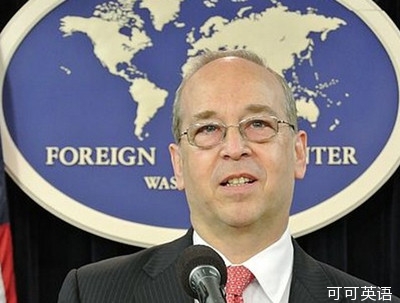The Asia Rebalance Is Here to Stay
亞洲再平衡是一項長期方略
By Daniel R. Russel
作者:丹尼爾·拉塞爾
The security and prosperity of the United States are inextricably linked to the peaceful development of the Asia-Pacific. That’s why nearly five years ago President Obama decided to make engagement in this region a strategic priority of the United States. And that’s why 2013 has been a year of intense diplomatic engagement in Asia, as we continue to implement that vision.
美國的安全和繁榮與亞太地區(qū)的和平發(fā)展密不可分。正是出于這一原因,歐巴馬總統(tǒng)在近五年前決定把在該地區(qū)的參與作為美國的一項戰(zhàn)略重點。也正是出于這一原因,2013年我們在亞洲開展了緊鑼密鼓的外交活動,以繼續(xù)落實上述愿景。
The United States is committed to expanding the ranks of stable, democratic and prosperous nations in Asia. We can play a vital role in promoting education, security and opportunity with our partners, providing greater freedom for potentially hundreds of millions of people in the Asia-Pacific. By expanding free trade and economic growth with our Pacific partners we can create a shared prosperity that benefits us all.
美國致力于讓更多亞洲國家實現(xiàn)穩(wěn)定、民主和繁榮。同我們的合作伙伴一道,我們能夠在促進教育、安全和機會方面發(fā)揮至關(guān)重要的作用,使亞太地區(qū)可能數(shù)以億計的人享有更大的自由。通過擴大與太平洋伙伴們的自由貿(mào)易和促進經(jīng)濟增長,我們能夠創(chuàng)建惠及各方的共同繁榮。
In fact, our $555 billion in exports to the region last year supported an estimated 2.8 million jobs right here in America. As Secretary of State John Kerry always says, economic policy and foreign policy are one in the same and that’s why, from the start of his tenure, he has made building on President Obama’s strategic rebalance in Asia a clear priority.
事實上,去年美國對該地區(qū)出口額達5550億美元,為美國國內(nèi)提供了大約280萬個就業(yè)機會。正如約翰·克里國務(wù)卿一貫指出,經(jīng)濟政策和外交政策具有同一性,因此,他就職以來始終把進一步落實歐巴馬總統(tǒng)提出的在亞洲的戰(zhàn)略再平衡作為一項明確的首要任務(wù)。
Secretary Kerry recently returned from visiting Vietnam and the Philippines, concluding his fourth trip to Asia in the past nine months. In his first year in office the Secretary has met with all 10 ASEAN Heads of State as well as their foreign ministers; the top leaders of Australia, China, Japan, Korea and many of the Pacific Island states; co-chaired ministerial meetings with Defense Secretary Hagel, Treasury Secretary Lew and Commerce Secretary Pritzker; joined U.S. Trade Representative Froman in hosting the leaders of the Trans-Pacific Partnership; and participated in regional multilateral meetings.
克里國務(wù)卿最近剛剛結(jié)束對越南和菲律賓的訪問,這是他在過去九個月內(nèi)第四次出訪亞洲。在擔(dān)任國務(wù)卿的第一年里,他會見了東南亞國家聯(lián)盟所有十國的國家元首和外交部長以及澳大利亞、中國、日本、韓國和許多太平洋島國的國家領(lǐng)導(dǎo)人;與國防部長哈格爾、財政部長盧和商務(wù)部長普利茨克共同主持了多次部長級會議;與美國貿(mào)易代表弗羅曼一道接待了跨太平洋伙伴關(guān)系成員國的領(lǐng)導(dǎo)人;并參加了多次地區(qū)性多邊會議。
As Assistant Secretary of State for East Asia and the Pacific, I oversee the bureau responsible for implementing the rebalance and have attended all of these meetings. I can attest that sitting down with John Kerry is never a box-checking exercise — he’s determined to get things done and not afraid to swing for the fences.
作為負責(zé)東亞和太平洋事務(wù)的助理國務(wù)卿,我主管負責(zé)實施這一再平衡的局機構(gòu),并出席了上述各次會議。我可以證實,與約翰·克里一道參加會談絕不是走形式——他決意取得成效,需要果斷決策時絕不遲疑。
But there is much more to our engagement than meetings. Teamwork among U.S. government agencies and the private sector was responsible for the speed and effectiveness of America’s response to the devastation of Super-Typhoon Haiyan in the Philippines, which Secretary Kerry saw firsthand last week in Tacloban.
但我們的參與遠遠不止這些會議。美國政府機構(gòu)和私營行業(yè)之間的團隊協(xié)作使美國能夠迅速、有效地應(yīng)對超級臺風(fēng)海燕在菲律賓造成的嚴重災(zāi)情,克里國務(wù)卿上周在塔克洛班親眼目睹了救災(zāi)情況。
The multi-million dollar program for expanding regional maritime capacities that Secretary Kerry announced in Vietnam this month builds on our extensive efforts to enhance prosperity and security in Southeast Asia.
克里國務(wù)卿于本月在越南宣布的數(shù)百萬美元的擴展區(qū)域性海事能力的項目,進一步擴大了我們?yōu)樵鲞M東南亞地區(qū)的繁榮與安全所做的大規(guī)模努力。
Our renewable energy, environment and climate change programs address challenges like sustainable development and food security that Secretary Kerry witnessed last week on the Mekong River.
我們的可再生能源、環(huán)境和氣候變化項目針對著克里國務(wù)卿上周在湄公河地區(qū)所看到的挑戰(zhàn),如可持續(xù)發(fā)展及糧食安全等。
Our new educational exchange and youth initiatives keep us on track with the “youthquake” that will transform demographics in the region and which Secretary Kerry spoke to at the Global Entrepreneurship Summit this fall in Malaysia.
我們新的教育交流和青少年行動計劃讓我們與將改變該地區(qū)人口面貌的“青年旋風(fēng)”保持同步,克里國務(wù)卿在今年秋天的全球創(chuàng)業(yè)峰會上向他們講了話。
And, as Secretary Kerry hears from so many partners on each of his visits to the region, our role as a security guarantor—combined with our insistence on peaceful resolution of disputes in accordance with international law and norms — keep tensions in the South and the East China Sea from escalating into conflict and ensuring stability and the free flow of commerce.
而且,正如克里國務(wù)卿在每次訪問該地區(qū)時從眾多合作伙伴那里聽到的,我們作為安全保障者的作用——再加上我們堅持以符合國際法律及準則的和平方式解決糾紛——制止了南中國海和東中國海的緊張局勢升級變成沖突,并保障了穩(wěn)定以及商務(wù)的自由流動。
The United States is using its full complement of political, diplomatic and economic tools to advance our values and interests in this dynamic region. That helps explain why our partnerships with Australia, Japan and the Republic of Korea are in such good shape. That helps explain unprecedented Chinese cooperation on critical issues like North Korea, Iran and climate change. And, judging by the results of his recent visit to Hanoi and Manila, this approach is paying dividends that will benefit both the U.S. and the region through greater economic growth, security cooperation, expanded educational and people-to-people ties, and progress on governance and human rights. With our allies and emerging partners, our engagement is growing every day.
美國正在全面利用相輔相成的政治、外交和經(jīng)濟手段在這個充滿活力的地區(qū)推進我們的價值觀和各項利益。這有助于解釋我們?yōu)槭裁赐拇罄麃啞⑷毡竞晚n國有如此良好的伙伴關(guān)系。這有助于解釋中國之所以在北韓、伊朗和氣候變化等關(guān)鍵議題上提供前所未有的合作。而且,從他最近訪問河內(nèi)和馬尼拉的成果來看,這個方針正在取得成效,將使美國及該地區(qū)通過增進經(jīng)濟增長、加強安全合作、擴大教育及民間聯(lián)系并在治國和人權(quán)方面取得進步而雙雙受益。有了我們的盟友以及新出現(xiàn)的合作伙伴,我們的參與正在與日俱增。
Secretary Kerry is clearly advancing President Obama’s strategy of rebalance initiated in early 2009 and developed over his first term. The rebalance continues to be a team effort led by the president, who has hosted a series of important meetings with Asian leaders throughout the year, including his unprecedented summit meeting with President Xi of China at Sunnylands, California. The vice president has likewise visited Singapore, Japan, China and the Republic of Korea in 2013 alone.
克里國務(wù)卿顯然正在推進歐巴馬總統(tǒng)于2009年年初提出并在第一個任期內(nèi)得到發(fā)展的再平衡戰(zhàn)略。再平衡戰(zhàn)略依然是在總統(tǒng)主導(dǎo)下的一項團隊努力,他在整個一年中主持了一系列同亞洲領(lǐng)導(dǎo)人的重要會晤,其中包括首次同中國國家主席習(xí)近平在加利福尼亞州森尼蘭舉行首腦會晤。而僅在2013年一年內(nèi),副總統(tǒng)也訪問了新加坡、日本、中國和韓國。
Some regional partners may fret when, for example, domestic U.S. politics prevent the president from taking his seat at meetings in Asia, but few serious people doubt America’s resolve or the Administration’s commitment to engagement in the Asia-Pacific.
一些地區(qū)合作伙伴可能會在美國國內(nèi)政治因素導(dǎo)致總統(tǒng)無法出席在亞洲舉行的會議時感到焦慮,但沒有多少嚴肅認真的人對美國參與亞太地區(qū)事務(wù)的決心或美國政府的這一承諾感到懷疑。
Some may question America’s staying power, but the leaders of every Asian country I know are hungry for American innovation and entrepreneurship and are watching the U.S. energy revolution with excitement, if not envy. Never has America’s presence in the region been more welcome, and seldom — if ever — has it been more important.
有些人可能會對美國的持久力提出質(zhì)疑,但我所知道的每個亞洲國家的領(lǐng)導(dǎo)人都渴望美國的創(chuàng)新和創(chuàng)業(yè)精神,并興奮地——如果不說是羨慕地——注視著美國的能源革命。美國在該地區(qū)的存在從未像現(xiàn)在這樣受到歡迎,而且很少——如果不說是從未——像現(xiàn)在這般重要。
The bottom line is this The United States enters 2014 positioned to capitalize on a year of intense engagement and investment in a region — the Asia-Pacific — that is increasingly critical to our future and to global growth.
總之,2014年伊始,美國蓄勢待發(fā),將在與我們的未來和全球增長日益重要的地區(qū)——亞太地區(qū)——開始密集接觸和投入的一年。

更多精品翻譯素材,敬請關(guān)注可可英語。











